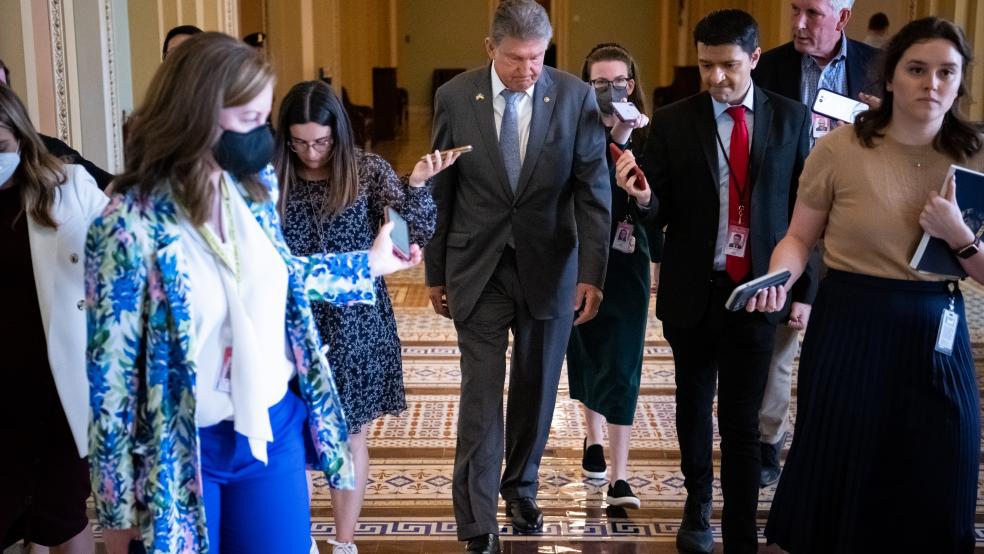Democrats have started their delicate dance again. Call it the Manchin Mambo.
As President Joe Biden and members of his party turn their attention to reviving elements of their stalled domestic agenda, their hopes once again rest on Sen. Joe Manchin. The West Virginia centrist late last year scuttled a $1.7 trillion package of climate programs, social spending and tax increases called the Build Back Better Act, leaving Democrats to wonder just what portions of their plan they might be able to salvage.
The key question remains: What does Manchin really want?
“This is now the time for Manchin to demonstrate he wants a deal of some sort by indicating exactly what would be acceptable to him. The time for 20 questions is over,” Bill Galston, a senior fellow at the Brookings Institution, told The Washington Post. “If he is serious about doing the deal, now is the time to do it.”
Manchin on Tuesday met with Senate Majority Leader Chuck Schumer (D-NY) and he indicated to reporters afterward that his focus is on fighting inflation and reducing the deficit, not on bringing back a sweeping social spending package. “Debt reduction is the only way to fight inflation,” Manchin reportedly said, adding that he wants to raise the corporate tax rate to 25% and close loopholes in the tax code. "There's not a Build Back Better revival," Manchin said. "There's not."
Manchin has indicated repeatedly that he has concerns about using a party-line reconciliation package for legislation that deals with social programs, emphasizing that such bills should go through regular order. At the same time, he has continued to express support for deficit reduction, energy and climate initiatives and lowering prescription drug costs as well as rolling back some of the 2017 Republican tax cuts through a reconciliation bill, which would need the support of all 50 Senate Democrats. Manchin has reportedly also launched bipartisan talks about an energy and climate change package, which could complicate any Democratic efforts to construct a party-line reconciliation bill.
“He remains seriously concerned about the financial status of our country and believes fighting inflation by restoring fairness to our tax system and paying down our national debt must be our first priority,” a spokeswoman said in a statement to The Washington Post that also mentioned fighting climate change, promoting U.S. energy independence and prescription drug costs as priorities.
White House worries Manchin won’t agree to any deal: The Post’s Jeff Stein and Mike DeBonis report that White House officials fear they won’t be able to reach any deal with Manchin by July 4, which many lawmakers see as the deadline for action before election season ramps up. Many officials reportedly say privately that they’d consider themselves lucky if they end up with a deal worth $1 trillion — and some reportedly note that Manchin has benefitted politically in conservative West Virginia from his high-profile defiance of President Biden and other Democrats.
“In recent weeks, White House officials have quietly tried gauging Manchin’s interest in a package that would consist primarily of clean-energy initiatives, prescription drug reform and higher taxes on the rich and corporations,” Stein and DeBonis report. The ideas being considered also include $500 billion in deficit reduction, a Manchin priority. “But despite his support for these provisions generally, Manchin has not yet made clear to the White House precisely what he would support in a final agreement, the people familiar with the administration’s discussions said.”
One unnamed White House adviser told the Post: “There’s real fear inside the building that Manchin’s stonewalling will run out the clock on Biden’s legislative agenda throughout the rest of the year, leading the administration and congressional Democrats into November without anything else to offer voters.”
The bottom line: Manchin may represent the crucial 50th Democratic vote for a reconciliation package, but while Democrats try to figure out what he’d support they can’t take the other 49 votes for granted. Sen. Kyrsten Sinema (D-AZ) opposes some of the ideas Machin supports, such as raising the corporate tax rate. “There are varying levels of optimism among different colleagues in the Senate. I am the most skeptical,” Sen. Dick Durbin (D-IL) told Bloomberg News. “I want to put two of my colleagues in a room with a blank sheet of paper and ask them, ‘What will you agree to?’”





